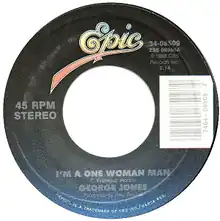I'm a One-Woman Man
"(I'm a) One-Woman Man" is a song co-written by American country music artist Johnny Horton and Tillman Franks. It was originally released as a single by Horton in 1956, whose version peaked at number 7 on the Billboard Hot Country Singles chart.[1] The song was twice recorded by American country music artist George Jones: first released on the album The Crown Prince of Country Music retitled "One Woman Man" in 1960, and later as "I'm a One Woman Man" released in November 1988 as the first single from his album One Woman Man. It peaked at number 5 on the Billboard Hot Country Singles chart [2] in early 1989 and it would be his final Top 10 solo hit. His final appearance on the Top-10 country singles chart arrived a year later as part of a duet recording with Randy Travis. In spite of the lack of radio hits as the 1990s dawned Jones remained a popular concert draw for the next two decades and continued to release original recordings into the mid 2000s.
| "I'm a One Woman Man" | ||||
|---|---|---|---|---|
 | ||||
| Single by George Jones | ||||
| from the album One Woman Man | ||||
| B-side | "Pretty Little Lady from Beaumont Texas" | |||
| Released | November 1988 | |||
| Genre | Country | |||
| Length | 2:17 | |||
| Label | Epic | |||
| Songwriter(s) | Tillman Franks, Johnny Horton | |||
| Producer(s) | Billy Sherrill | |||
| George Jones singles chronology | ||||
| ||||
Chart performance
Johnny Horton
| Chart (1956) | Peak position |
|---|---|
| U.S. Billboard Hot Country Singles | 7 |
George Jones
| Chart (1988–1989) | Peak position |
|---|---|
| US Hot Country Songs (Billboard)[3] | 5 |
Year-end charts
| Chart (1989) | Position |
|---|---|
| Canada Country Tracks (RPM)[4] | 93 |
| US Country Songs (Billboard)[5] | 70 |
Other versions
- Steve Young covered the song on his pioneering Country rock/Outlaw country album Rock Salt & Nails in 1969.
- Glen Campbell covered the song on his 1987 album Still Within the Sound of My Voice.
- Josh Turner covered the song on his 2007 album Everything Is Fine under the title "One Woman Man."
References
- "Johnny Horton singles". Allmusic. Retrieved November 25, 2011.
- "George Jones singles". Allmusic. Retrieved November 25, 2011.
- "George Jones Chart History (Hot Country Songs)". Billboard.
- "RPM Top 100 Country Tracks of 1989". RPM. December 23, 1989. Retrieved August 28, 2013.
- "Best of 1989: Country Songs". Billboard. Prometheus Global Media. 1989. Retrieved August 28, 2013.